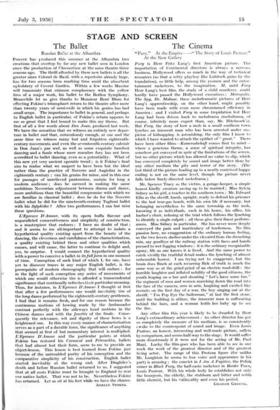Russian Ballet at the Alhambra
STAGE AND SCREEN
The Ballet FOKIKE has produced this summer at the Alhambra two creations that overtop by far any new ballet seen in London since the production of Choreartium at the same theatre three seasons ago. The thrill afforded by these new ballets is all the greater since Colonel de Basil, with a repertoire already huge, has for two seasons been marking time amid the absorbent upholstery of Covent Garden. Within a few weeks Massine will transmute that crimson complacency with the yellow fires of a major work, his ballet to the Berlioz Symphony. Meanwhile let us give thanks to Monsieur Rene Blum for effecting Fokine's triumphant return to the theatre after more than twenty years of semi-exile in which his genius has had small scope. The importance to ballet in general, and perhaps to English ballet in particular, of Fokine's return appears to me so great that I feel bound to make this my theme. But first of all a few words about Don Juan, produced last week. We have the sensation that we witness an entirely new depar- ture in ballet and that, miraculously enough, at one and the same time we witness many lost and forgotten eighteenth- century movements and even the seventeenth-century cabriole in Don Juan's pas seul, as well as some exquisite barefoot dancing and a finale whose mere macabre fury has not been accredited to ballet dancing, even as a potentiality. What of this new yet very ancient operatic trend ; is it Fokine's final aim to realise what we suspect to have been but the ideal rather than the practice of Noverre and Angiolini in the eighteenth century ; can his genius for mime, and in this case for passages of unrelieved pantomime, sustain for long a modern audience ; does he succeed in making the same ambitious Noverrian adjustment between drama and dance, more ambitious than the beautiful compromise with which we are familiar in classical ballet ; does he do for the Noverre ballet what he did for the nineteenth-century Taglioni ballet with his Sylphides? After two performances I can but raise these questions.
L'Epreuve D'Amour, with its opera buffs flavour and unparalleled consecutiveness and simplicity of construction, is a masterpiece that endures ; I have no doubt of that ; and it seems to me all-important to attempt to isolate a hypothetical quality existing apart from the beauty of the dancing, the cleverness and carefulness of the characterisation, a quality existing behind these and other qualities which causes, and will cause, the latter to continue to delight and, yes, to surprise. I would connect the hypothetical quality with a power to conceive a ballet in its full form in one moment of time. Conception of such kind of which I, for one, have yet to discover traces in any major English ballet, is the prerequisite of modern choreography that will endure : for in the light of such conception any series of movements of which one would otherwise tire is afforded a transcendental significance that continually refreshes their particular meaning. Thus, for instance, in L'Epreuve D'Amour I thought at first that after a few performances one would inevitably tire of the long dance performed by the eighteenth-century gentlemen. I find that it remains fresh, and for one reason because the continuous motions of bowing made by the Ambassador contrast perfectly with the sideways head motions in the Chinese dances and with the fouettis of the finale. Conse- quently the relevance, wit and dignity of these bows is a heightened one. In this way every nuance of characterisation serves as a part of a durable form, the significance of anything that seemed at first of but momentary interest is multiplied. L'Kpreuve D'Amour, and the particular points at which t.'okine has restored his Carnaval and Petrouchka, ballets that had almost lost their form, seem to me to provide an ehjeqtllesson. This lesson is, best learned from Fokine just because of the untroubled purity of his conception and the comparative simplicity of his construction. English ballet started inevitably at the wrong end. After Diaghilev's death and before Russian ballet returned to us, I suggested that at all costs Fokine must be brought to England to rear our native ballet. That was not to be. Nevertheless Fokine has returned. Let us sit at his feet while we have the chance.
ADRIAN, STOKES.














































 Previous page
Previous page